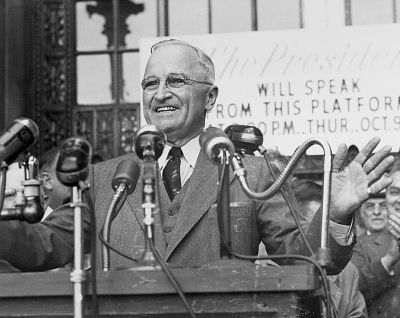Here are eight things to know about the special and far-reaching powers that presidents have.
President Donald Trump on Friday declared a "national emergency" to pay for his wall on the southern border.
1. What is it?
Presidents have long had broad discretion to declare national emergencies and can tap into an array of emergency powers when they do.
While a president's emergency powers aren't spelled out in the Constitution, legal scholars say the president is entitled to them under the broadly defined "executive power." Abraham Lincoln used the power to suspend habeas corpus during the Civil War, while Franklin Roosevelt used it order the internment of 100,000 Japanese-Americans during World War II.
Congress set out to limit the power after Watergate with the National Emergencies Act of 1976. The act scaled back the provisions of federal law that granted emergency authority to the president — then about 470 — and was intended to give lawmakers a way to check presidential power.
2. What are the powers?
An analysis by the Brennan Center for Justice, a liberal law and public policy institute, at New York University's School of Law identified 136 statutory powers that emergency declarations could give the president, covering everything from the military and land use to public health and agriculture. The president could, for example, take over or shut down radio stations or even "suspend a law that prohibits the testing of chemical and biological weapons on unwitting human subjects," the analysis says.
In the case of Trump's border wall, the president is relying on Section 2808 of the Title 10 U.S. Code. It says if the president declares a national emergency "that requires use of the armed forces," the defense secretary "may undertake military construction projects...not otherwise authorized by law that are necessary to support such use of the armed forces."
3. Can Congress stop it?
Theoretically, but not likely. The National Emergencies Act originally held that Congress could repeal a presidential emergency declaration with a simple majority vote in both houses, but that was later amended because of a 1983 Supreme Court ruling involving separation of powers. As a result, both houses of Congress would have to act with a veto-proof supermajority, according to some experts. That's highly unlikely, since the current divided Congress has had problems even keeping the government open.
4. Can the courts?
Possibly. Washington Democratic Rep. Adam Smith, chair of the House Armed Services Committee, said on MSNBC'S "The Rachel Maddow Show" that such a measure would "be subject to a court challenge very quickly."
Trump acknowledged to reporters at the White House on Friday that his declaration will be challenged in the courts and that the case would likely wind up at the Supreme Court, where he predicted victory. But experts have noted the legal process could take a long time, and there's a likelihood any construction would be put on hold until the court case was concluded.
5. Have other presidents used the power?
Yes, many times. Since the 1976 law was enacted, presidents declared national emergencies 58 times, but never to fund a stalled policy goal. Republicans and Democrats say doing so could lead down a slippery slope.
6. Has Trump?
Yes, three times. He most recently used the National Emergencies Act in November of last year to slap sanctions on high-ranking members of the Nicaraguan government.
7. Has a president ever been blocked?
Yes, but not in decades. President Harry Truman tried to use emergency powers to nationalize the steel industry during the Korean War in 1952 over objections from Congress. Truman maintained that "the president has the power to keep the country from going to hell." The bid was blocked by the U.S. Supreme Court, which found in a 6-3 ruling that Truman had exceeded his authority.
8. Are other emergencies in effect?
Thirty-one national emergencies are still ongoing, with the longest-running one involving sanctions on Iran in 1979 over the hostage crisis, according to the Brennan Center. The president needs to renew national emergencies annually.












